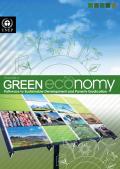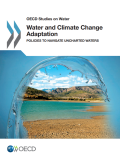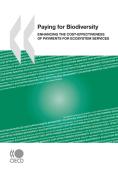
The Green Economy Report is compiled by UNEP’s Green Economy Initiative in collaboration with economists and experts worldwide. It demonstrates that the greening of economies is not generally a drag on growth but rather a new engine of growth; that it is a net generator of decent jobs, and that it is also a vital strategy for the elimination of persistent poverty. The report also seeks to motivate policy makers to create the enabling conditions for increased investments in a transition to a green economy.
The report includes chapters on the following areas:
- Agriculture
- Fisheries
- Water
- Forests
- Renewable Energy
- Manufacturing
- Waste
- Buildings
- Transport
- Tourism
- Cities
- Modelling
- Finance

This report sets out the challenge for freshwater in a changing climate and provides policy guidance on how to navigate this new "waterscape". It highlights the range of expected changes in the water cycle and the challenge of making practical, on-site adaptation decisions for water. The report offers policymakers a risk-based approach to better "know", "target" and "manage" water risks and proposes policy guidelines to prioritise action and improve the efficiency, timeliness and equity of adaptation responses. The report also highlights general trends and good practices drawn from the OECD Survey of Policies on Water and Climate Change Adaptation, covering all 34 member countries (Australia, Austria, Belgium, Canada, Chile, Czech Republic, Denmark, Estonia, Finland, France, Germany, Greece, Hungary, Iceland, Ireland, Israel, Italy, Japan, Korea, Luxembourg, Mexico, The Netherlands, New Zealand, Norway, Poland, Portugal, Slovak Republic, Slovenia, Spain, Sweden, Switzerland, Turkey, United Kingdom, and United States) and the European Commission.
This toolkit focuses on inclusive green growth—growth that not only helps green economies, but also helps move towards sustainable development by ensuring environmental sustainability contributes to, or at least does not come at the expense of, social progress. While there is good reason to think that improved environmental performance will benefit the poorest and most vulnerable, green growth policies must be carefully designed to maximise benefits and minimise costs for them, particularly during the transition. There is thus a critical need for policy design that also ensures that skills are upgraded and that jobs are decent, that vulnerable groups are not marginalised or left behind, and that revenues from fiscal reforms are also channeled into broader social protection and health measures.
A number of the tools that will be mobilised to implement inclusive green growth policies are "classic" public management tools, but this document focuses only on the most relevant instruments vis-à-vis green growth in developing countries, as these instruments are widely known and implemented the world over. What this toolkit aims for instead is to provide policy-makers with:

Biodiversity and ecosystem services provide tangible benefits for society, such as food provisioning, water purification, genetic resources or climate regulation. These services provide critical life support functions and contribute to human health, well being and economic growth. Yet biodiversity is declining worldwide and, in some areas, this loss is accelerating. The need for policies that promote the conservation and sustainable use of biodiversity and ecosystem services is more important than ever.
Payments for Ecosystem Services (PES) is a direct and flexible incentive-based mechanism under which the user or beneficiary of an ecosystem service makes a direct payment to an individual or community whose land use decisions have an impact on the ecosystem service provision. Interest in PES has been increasing rapidly over the past decade: PES are proliferating worldwide and there are already more than 300 programmes in place today at national, regional and local levels.
In the context of the economies of the world becoming greener, this book provides a global and interdisciplinary overview of the condition of the world’s water resources and the infrastructure used to manage it. It focuses on current social and economic costs of water provision, needs and opportunities for investment and for improving its management. The book describes the large array of water policy challenges facing the world, including the Millennium Development Goals for clean water and sanitation, and shows how these might be met. There is a mixture of global overviews, reviews of specific issues and an array of case studies. It is shown how accelerated investment in water-dependent ecosystems, in water infrastructure and in water management can be expected to expedite the transition to a green economy. The book provides a key source of information for people interested in understanding emerging water issues and approaches that are consistent with a world that takes greater responsibility for the environment.
